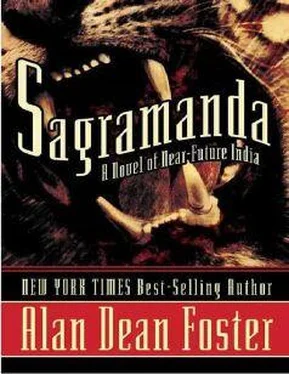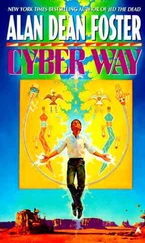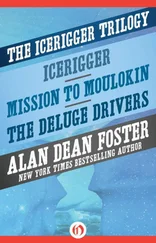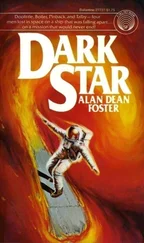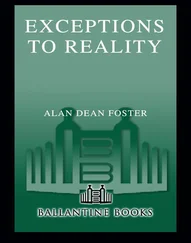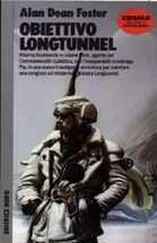Alan Foster - Sagramanda, a Novel of Near-Future India
Здесь есть возможность читать онлайн «Alan Foster - Sagramanda, a Novel of Near-Future India» весь текст электронной книги совершенно бесплатно (целиком полную версию без сокращений). В некоторых случаях можно слушать аудио, скачать через торрент в формате fb2 и присутствует краткое содержание. Жанр: Фантастика и фэнтези, на английском языке. Описание произведения, (предисловие) а так же отзывы посетителей доступны на портале библиотеки ЛибКат.
- Название:Sagramanda, a Novel of Near-Future India
- Автор:
- Жанр:
- Год:неизвестен
- ISBN:нет данных
- Рейтинг книги:5 / 5. Голосов: 1
-
Избранное:Добавить в избранное
- Отзывы:
-
Ваша оценка:
- 100
- 1
- 2
- 3
- 4
- 5
Sagramanda, a Novel of Near-Future India: краткое содержание, описание и аннотация
Предлагаем к чтению аннотацию, описание, краткое содержание или предисловие (зависит от того, что написал сам автор книги «Sagramanda, a Novel of Near-Future India»). Если вы не нашли необходимую информацию о книге — напишите в комментариях, мы постараемся отыскать её.
Sagramanda, a Novel of Near-Future India — читать онлайн бесплатно полную книгу (весь текст) целиком
Ниже представлен текст книги, разбитый по страницам. Система сохранения места последней прочитанной страницы, позволяет с удобством читать онлайн бесплатно книгу «Sagramanda, a Novel of Near-Future India», без необходимости каждый раз заново искать на чём Вы остановились. Поставьте закладку, и сможете в любой момент перейти на страницу, на которой закончили чтение.
Интервал:
Закладка:
Less officially, he was there to find another man. A renegade employee who had disappeared in the possession of valuable company property but who was believed to still be hiding somewhere in the city. A researcher who had stumbled across a discovery potentially worth billions, if not trillions. Of dollars, not rupees. An imprudent local employee who needed to be brought back into the corporate fold before he might misguidedly pass the sensitive information he had absconded with on to another competing multinational.
How Chal went about his business was not of particular concern to his corporate masters. Were he to be caught or challenged while per forming his duty, any knowledge of him would be disowned by the same people who saw to it that he was so well compensated. They were interested only in results, not in methodology. Chal had complete freedom to do what was necessary. The cutthroat world of global com petition demanded it, even encouraged it.
Personally, Chal had nothing against the researcher who had gone astray. He would prefer not to have to kill him, or torture him to reveal the whereabouts of what he had taken. Chal was perfectly prepared to do either, or both, as the occasion demanded. What he
really wanted was to get back to New York. As always, he would do anything that would expedite his departure from the homeland of his mother. His life would have been easier had he simply based himself in Delhi or Mumbai. He categorically refused, preferring to endure the occasional monumental commute. New York was his home, America and Europe his playground. Not India.
Thus far he had been reduced to little more than following blind leads and asking endless questions. No, that was not quite true. One coworker of the missing researcher had been obstinate and had refused to answer any questions at all. Chal, who was of more than average height and weight and physically intimidating, had been forced to administer encouragement. Informing the pigheaded one that he was only doing his job, he had proceeded accordingly. Then he had been compelled to wait until the dazed, chastised coworker, remorselessly hammered down to the corridor floor, finished spitting out blood and teeth and struggled to talk again.
Yes, the bloodied, sobbing, and now fully compliant worker knew Taneer Buthlahee. No, she hadn't seen, heard from, or had any contact with the absent researcher in something like five months. No, she had no idea where he had gone, what he was doing, or what his immediate plans were.
Chal had thanked her calmly, turned to depart down the office corridor that was empty save for the two of them, then by way of farewell and a final object lesson kicked her in her already ruined mouth one last time, breaking her lower jaw. It ensured she would keep quiet until he was out of the building. In the course of his work he had been forced to beat on many people. He had never discriminated between subjects. He knew he had a bad habit of giving in to impatience, but when he required answers, he wanted answers. His life was not a movie, and he had neither the time nor the inclination to coddle the recalcitrant among those with whom he dealt.
Certainly he liked his job, though not every aspect of it. Take the travel, for example. When the company sent him to fix problems in places like London or Frankfurt, he delighted in the opportunity. Because of his background and his specialized knowledge of his mother's homeland, however, the majority of overseas assignments tended to see him working the streets and byways of Bangalore and Mangalore more often than Berlin or Milan.
He was very good at his work and prided himself on never having failed to successfully complete an assignment. The company paid him well, albeit surreptitiously. He stayed in the best hotels, always under a fictitious name that matched one of the several fictitious passports he always carried with him. Multinational corporations were even more skillful at obtaining such useful documents than were international terrorists.
Another employee might have spent as much time as possible at the five-star hotel he had chosen for his base of operations, availing himself of its programmable air-conditioning, fine restaurants, box connections, swimming pool, bakery, and direct-dial call girl service. Chal was far too conscientious for that. He would enjoy himself on his free time. There would be no idle idylls until he had completed his assignment.
His employers preferably wanted Mr. Taneer Buthlahee returned to the fold alive, or at the very least in sufficient condition to converse. At least for a few days. After that… If matters grew strained, Chal had been instructed to secure only the information that had been illegally appropriated by the wayward Mr. Buthlahee, and his employers would manage without questioning him. It was important this be accom plished as swiftly as possible, lest the missing researcher have the opportunity to solicit a large monetary offer from one or more of their mutual employer's rapacious competitors.
In addition to the considerable resources the company placed at his disposal, Chal had his own, private network of connections and informers. If such an offer as the company was worried about were
to be floated, Chal was as likely as the vagrant researcher to hear about any legitimate response. This would put him in position to intercept both the errant scientist and the offer. It was likely that those putting forth such an offer would object to the visiting Mr. Schneemann's intrusion. That would present a problem. Chal did not worry about such a possibility. He had handled "problems" before. Some of them were even still alive.
If the pressures of work, or simply of dealing with Sagramanda, became too much for him, Chal knew where to go to simmer down for a day or two. Kanha National Park was a short charter flight from the city but a world away from the urban chaos of the enormous metropolis. It was where Kipling had found the inspiration for his Jungle Book stories. A hilly, ferociously protected segment of old India, it was home to leopards and tigers, sambar and the rare barasingha. There was a little lodge where one would not be noticed, away from the more popular tourist venues, where he could relax and drink tea and nibble homemade pakoras…
He dragged himself back to the moment. The verdant tranquility of Kanha was far away.
As he stepped out of the air-conditioned taxi, the heat and humidity smacked him in the face like the hot towels thrown by the attendant who worked in the hotel sauna. It had always amused him that the posh hotel boasted a sauna, when often it seemed no less hot and humid right outside that establishment's climate-sealed front door. He had less than a block to walk. In that time he encountered perhaps forty people making their home on the older street. A few had raised the crudest of lean-tos of found cardboard and wood against the stone and concrete walls of the permanent buildings. They were well-off compared to the families that were living in the gutter. Hands and voices were raised in his direction as he approached. Both fell quickly when those doing the imploring got a good look at the face of the well-dressed, comparatively light-skinned pedestrian. Poor does not necessarily mean ignorant, much less stupid.
Chal entered the building, cleared security, and took a lift to the twenty-first floor. At the end of the surprisingly clean and neat hallway was a wall and door of transparent polycarbonate. Glowing letters floating about a centimeter in front of the unshatterable material declared that the rooms beyond housed the offices of Purkhasee Financial, Ltd.
He announced himself to the door. Someone within cleared him, a hidden buzzer sounded, and he pushed his way through. Ignoring the receptionist before she could so much as open her mouth, he turned to his left and walked all the way down to the last office. He had been here before.
Читать дальшеИнтервал:
Закладка:
Похожие книги на «Sagramanda, a Novel of Near-Future India»
Представляем Вашему вниманию похожие книги на «Sagramanda, a Novel of Near-Future India» списком для выбора. Мы отобрали схожую по названию и смыслу литературу в надежде предоставить читателям больше вариантов отыскать новые, интересные, ещё непрочитанные произведения.
Обсуждение, отзывы о книге «Sagramanda, a Novel of Near-Future India» и просто собственные мнения читателей. Оставьте ваши комментарии, напишите, что Вы думаете о произведении, его смысле или главных героях. Укажите что конкретно понравилось, а что нет, и почему Вы так считаете.
